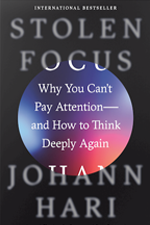Table of contents
🚀 The book in short
The book explores the growing crisis of our diminishing ability to pay attention. The author, noticing his own decreasing attention span, embarks on a journey to understand why this is happening. He interviews leading experts on human attention and studies their scientific findings, discovering that much of what we think we know about this crisis is incorrect.
The book discusses how our constant switching between devices and tabs is diminishing and depressing. Hari tries various self-help solutions, including abandoning his phone for three months, but finds that these solutions don't work in the long term.
The book suggests that our inability to focus is affecting our ability to solve problems, and it discusses the design of phone and computer apps and their impact on our attention spans. Hari presents data suggesting that students switch tasks every 65 seconds, while adults in offices tend to remain focused on one thing for just three minutes on average.
🎨 Impressions
How I discovered it
This book was recommended to me by Patrick McKeown, the author of The Oxygen Advantage, while he was teaching his course on breathing to me.
Who can benefit from it?
It could be beneficial to a wide range of audiences:
- Individuals struggling with focus and attention: The book provides insights into why our attention spans are diminishing and offers practical solutions to reclaim our focus.
- Professionals in the tech industry: The book critically examines the tech industry's business model of profiting from our attention, which could be insightful for those working in this field.
- Educators and parents: The book questions the current education model and discusses the link between parental stress and ADHD in children, making it a valuable resource for educators and parents.
- Psychologists and therapists: The book explores the psychological aspects of attention and distraction, which could be useful for professionals in the field of psychology and therapy.
☘️ What I’ve learned
- In order to achieve depth and combat the increasing superficiality of the world, it is more beneficial to prioritize reaching a deep understanding of a few things rather than trying to do many things quickly. This idea is explored by Greg McKeown in his book Essentialism, which emphasizes the importance of focusing on important tasks rather than easy ones.
- Multitasking hinders cognitive abilities and progress, while focusing on one task at a time, or "monotasking," aligns with our brain's natural function and enhances productivity. Achieving a state of flow requires pursuing a meaningful goal with focused attention.
- Contrary to popular belief, mind wandering serves a crucial purpose in making sense of the world. Allowing your brain some time to wander can be beneficial.
- Reading fiction is not a futile activity. It actually helps train your brain to empathize with and understand different characters, thereby enhancing your empathic skills.
- Our economic system is build to drive progress. Money plays a central role into this system and companies are focussed what they earn bottom line. Nowadays the platform that earns the most attention, earns the most money. Public companies with stocks simply can’t restructure itself protecting your attention, because they will earn less money, which is bad for the companies stocks. Do not trust new tech.
- Our negativity bias makes us more prone to pay attention towards negative things. Where companies are focussed on getting your attention, the algoritm of these companies will focus on negative content. It is a downards spiral.
- The concept of Cruel Optimism was a great nuance for my own mindset. I love to read on the stoics and taking your own responsibility. But still you have to take into account, for you to decide to do good, there are 100 programmers and marketers working against you. It seems an unfair battle.
- The newsoutlets also compete for your attention, again, negativity bias. The more shocking news, the more readers. This makes us Hypervigilant, which in turn activates our Sympatethic Nervous System, which leads to attention problems. Focus on a correct breathing pattern and read books like The Oxygen Advantage, Breath, or Enlightment Now to counter this.
- Genes aren’t destiny; rather they affect probability. In other words; Genetics loads the gun, lifestyle pulls the trigger.
- In a world where information is ever changing. Why fill the heads of children with information? Let them play and learn to adapt and think for themselves.
